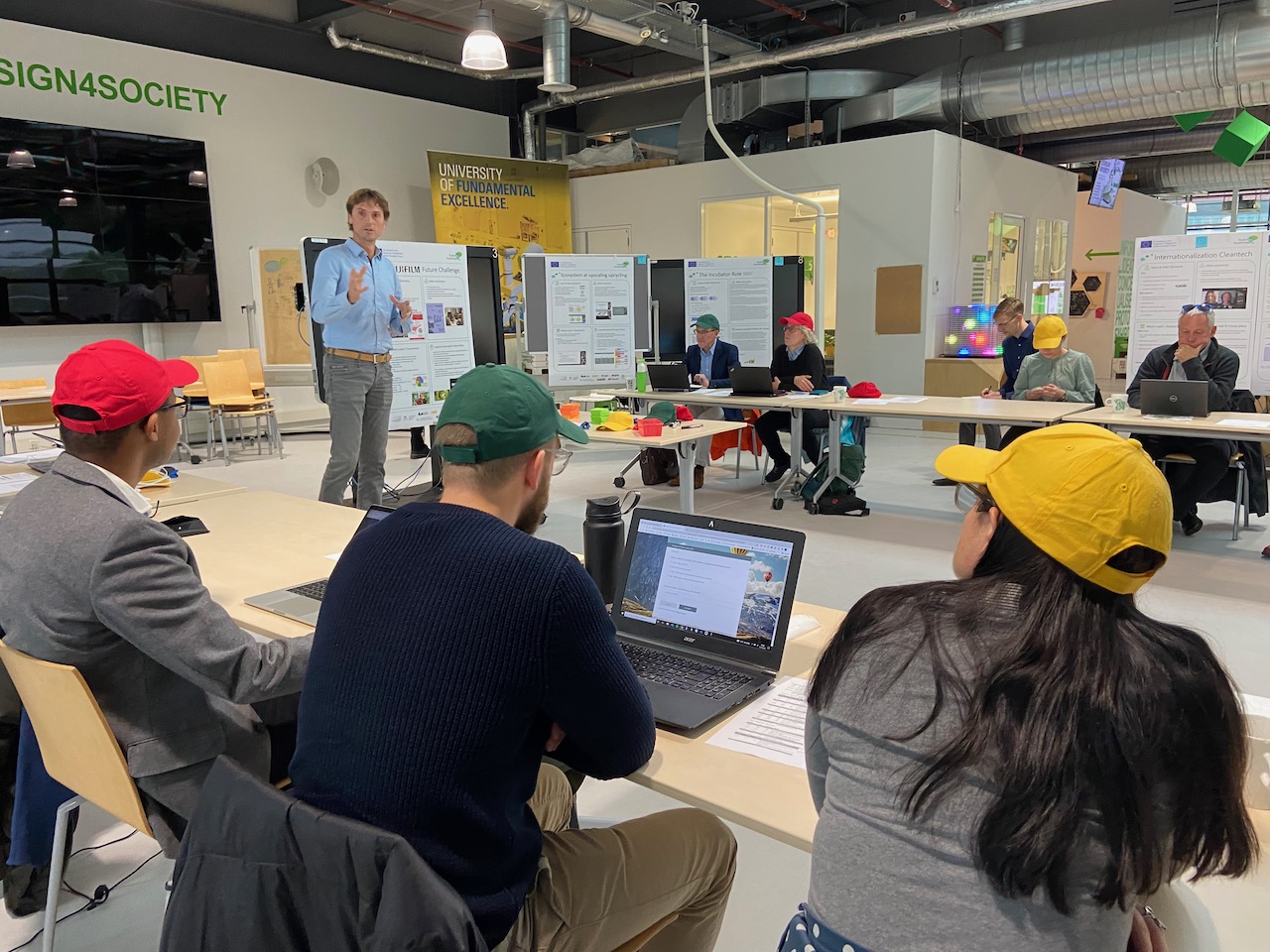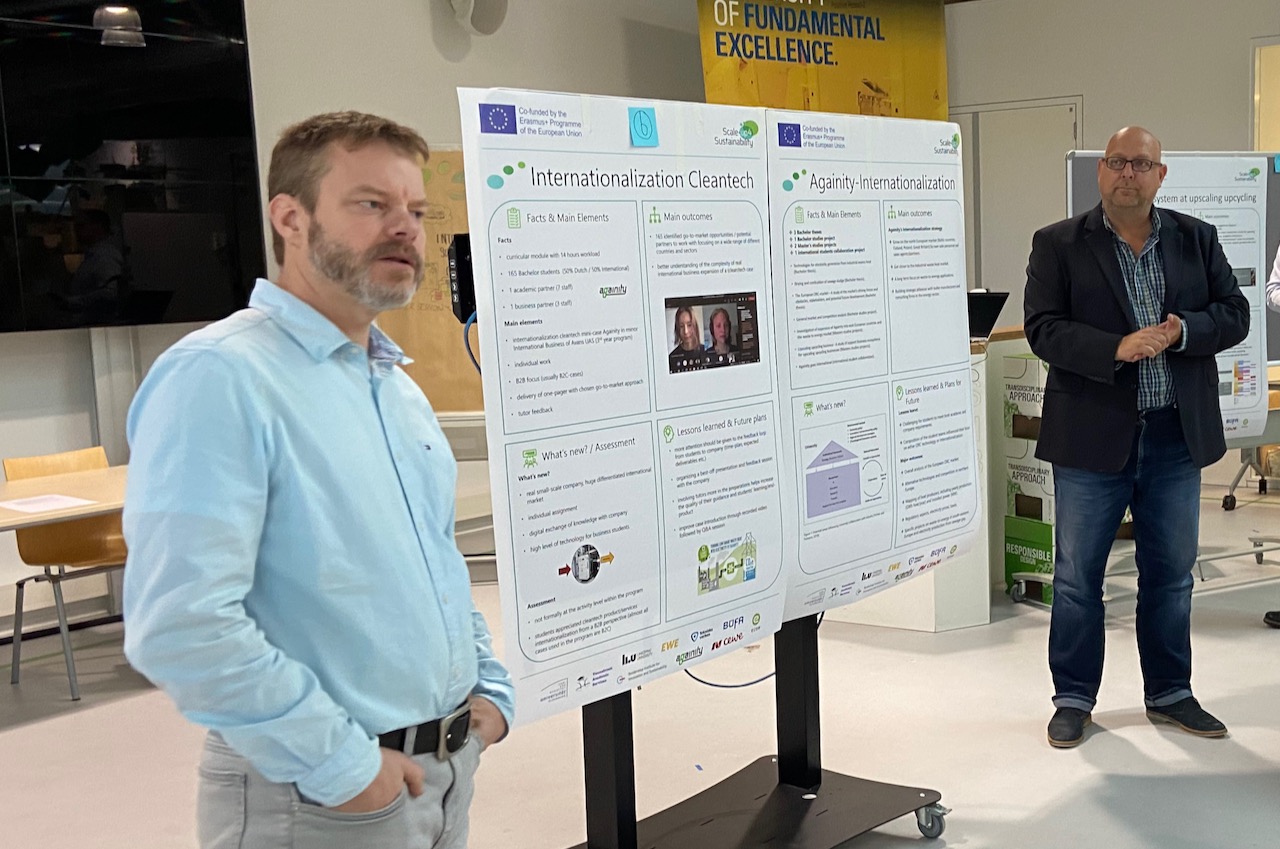Final S4S- Conference: 13-15 October 2021 Enschede
As planned, we organized a final conference between 13-15 October, 2021, to present and discuss the results of all S4S-projects. After some virtual consortium meetings, we were glad to meet in person in and around the campus of the University of Twente. To prepare the conference, consortium partners summarized the results of their projects using a poster format with the following structure:
- Facts (described quantitatively and qualitatively) and main elements
- Main outcomes
- What’s new – how is the projects assessed?
- Lessons learned & future plans.
At October 13th, we organized a meeting between delegates from LiU and University Twente regarding future challenge-based learning experiences within the ECIU organization. ECIU is an international network of research-intensive universities, with collective emphasis on innovation, creativity and societal impact. LiU and University Twente are members of ECIU, an online collaboration between universities that supports innovation and valorization. In addition, VAS organized a „green” creativity workshop in which LiU-staff participated. In this ideation workshop, students discussed possible solutions for UN Sustainable Development Goal 4 (Education for all) using Lego Serious Play.
Apart from presenting the results of all S4S-projects, we aimed to refine and improve our findings during the plenary days, October 14 and 15. We focused on exchange of experiences and concretizing actions to disseminate our results via poster presentations, World Café discussions, and the Borderstep Platform.
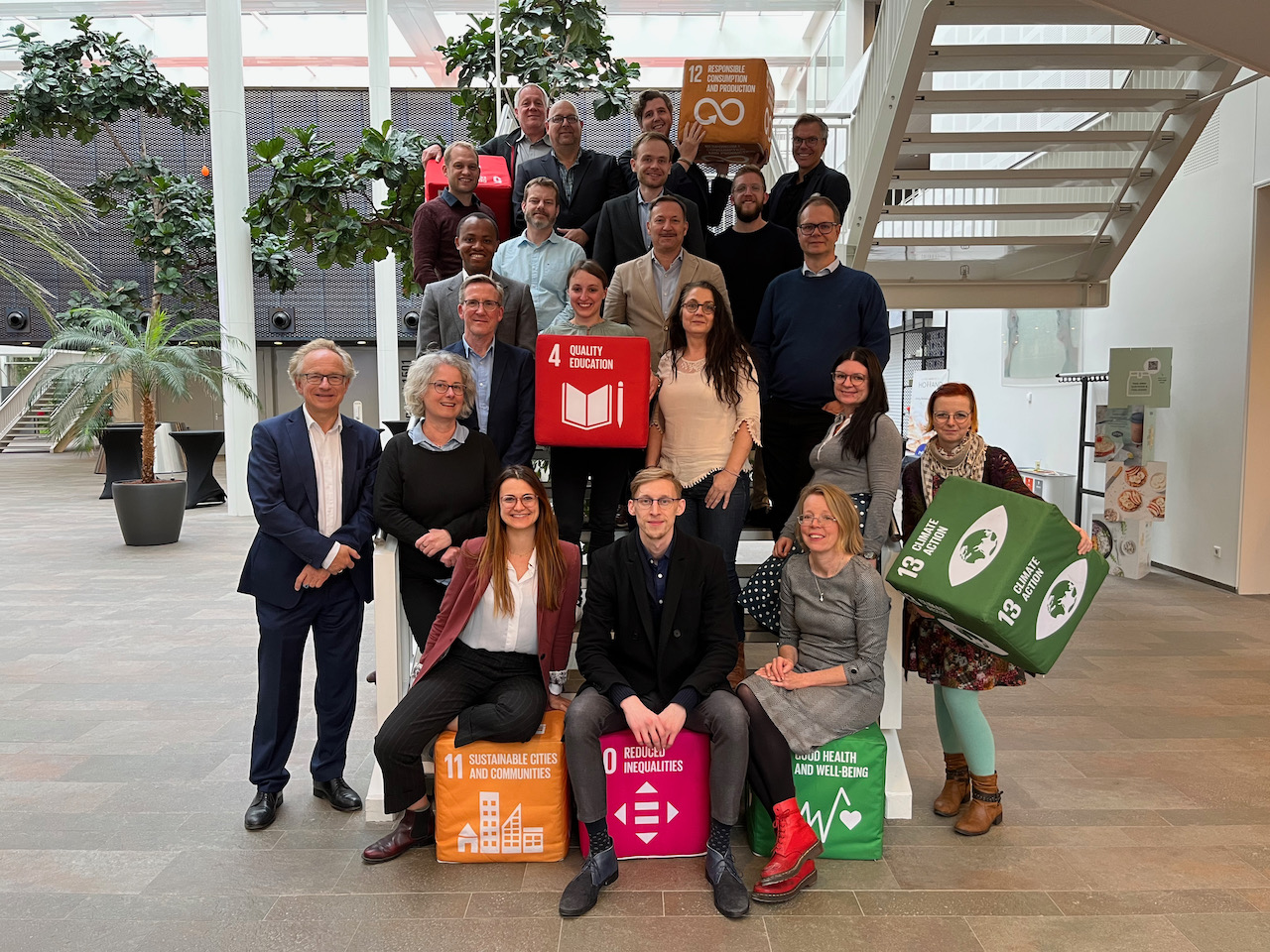
Participants of the S4S-conference in Enschede
You can find the report of findings here
This infographic summarises the conference:
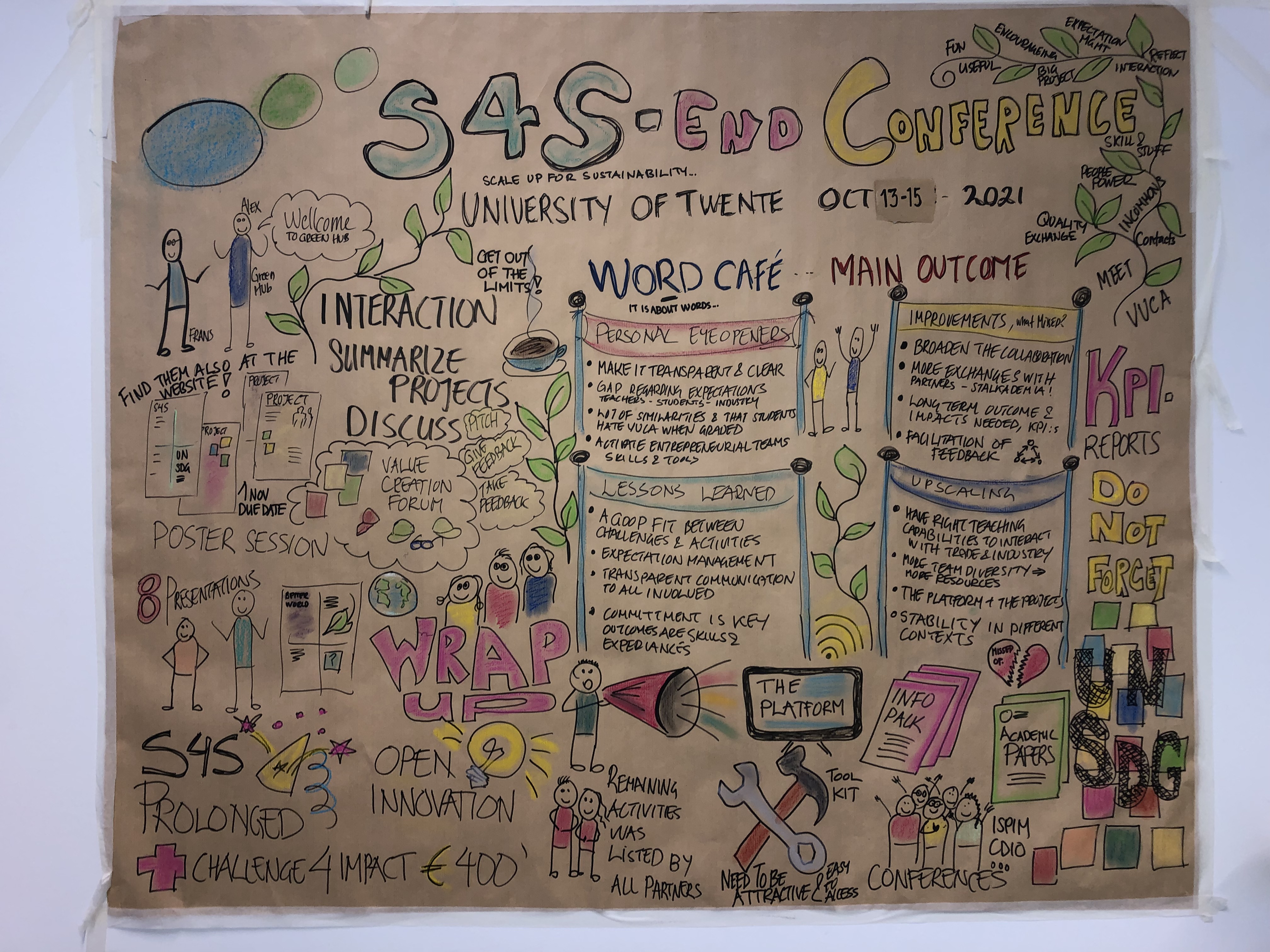
Infographic made by Charlotte Norrman (Linköping University)
Poster presentation & discussion
During the plenary conference, 8 posters were presented and discussed. The remaining 9 posters were not plenary presented. These were discussed bilaterally.
Consortium partners gave their feedback using the following perspectives:
- Blue - What would a student think? (both good and bad)
- Yellow - What would a business partner think? (both good and bad)
- Green - What was good?
- Red - What can be done better?
During the S4S activities, consortium participants used these perspectives and considered these as a valuable evaluation format.
Poster presentation of Michiel de Hair, Manager Open Innovation hub of Fujifilm Europe
Below we categorise the remarks of the different perspectives:
Student perspective
- Skills. Which student competences are needed? What’s in for me as student?
- Follow up. Will the event continue and how can more students get opportunity to participate? If we get to keep the idea, are there any courses where we can continue to work with our ideas? Am I allowed to own my ideas and implement these? Can I work at your company after the Challenge?
- Tools. how can you support the creativity processes of students?
- Assessment and grading. As a student, I would like this assessment to be part of the evaluation of my examination of the course. How do you assess and grade my contribution? It would be great as a student to get kind of certificate on the entrepreneurial skill development that I achieved.
Poster presentation of Joakim Wren (Againity, Sweden) and Rogier de Jong (Vennebroek Academic Services, The Netherlands ) about their exchange project
Business perspective
-
- Resources. How much time do I have to invest as a business partner in a challenge? How do you prepare companies so that they know what to expect in such collaboration with students?
- Digitalization. At considering an online format: how and do you at all want to attract more international businesses
- Tools. Is there a structure, toolbox for companies to establish spin-off experiences?
- Competencies. As a business partner I am also interested to support/encourage my own sustainable entrepreneurship competencies. Can I also take part at the evaluation?
- Creativity & Innovation. Great idea to create so many different channel judgements and ideas for your product. Good to obtain student ideas; it stimulates our “thinking out of the box”
- Finance. Do you have internal funds ready to work with the ideas, or how do you arrange the work with the ideas afterwards?
- Results & impact. How can my company benefit from your results? Is there any report? Are you sharing the concept in any other way?
- Follow up. If we as a company want to implement the ideas into new products: how do we start up a collaboration like this? What is the business impact? Can the ideas be replicated to our other businesses? If a good idea is rejected by our company and the idea cannot be worked with by the students, can other companies come in and by the idea or will it just get lost? Or can it be used elsewhere?
- Intake of students. How to make sure that our company get real motivated students participating in the challenge program?
Encouraging perspective (What was good)?
- Student / business collaboration. Great that you have managed to develop this to a real center where you can continue the work! valuable both for your company and for students. I really like the idea that the business partners are challenge providers and coaches at the same time. Did you train the business partners to act as coaches? Great approach that students get involved in the processes that start-ups have to go through and are involved with different companies to learn different ways of dealing with situations. Great commitment from the company. Multi-background international teams: surprising ideas come to life; 10 weeks program allows enough time for students to internalize the challenge; results achieved despite it had to be online, this is a great starting point for a hybrid or physical forms for next editions.
- Methodology. Good, that you systematized all the ideas and approaches within your company to give them what they need and to clear your interest and objectives while incubating them. Good combination of teaching self-reflection to the students and using the results to reflect on the effect of teaching methods on the university side. Good idea to use self-assessment as tool to show the students what progress they make. Good for the "technical students" that generally are not good and reflect upon their knowledge and skills. And in the end of the course implement these kinds of questions in a reflection paper. Make it standard in Entrepreneurship courses!
- Diversity of teams. It's impressing that you involve students from 4 different departments. Also mixing students from different disciplines is a good way for them to learn how work in a company team would look like. A focus is on team diversity (different background, study course, skills) is a great recipe for learning.
- Follow up. I like the buy-out process of the ideas, so that business can possess the idea without interference of patent rights etc. The buyback option is great! Adds a lot of relevance and motivation for the students. Great idea to make the ideas buyable so students feel their work is worth something for the company.
- Internationalization. Nice to see how cross-border exchange could be organized between aa large group of students and a business.
- Strategy. Good that you are trying to improve and systematize the venturing process and more importantly you use different strategies.
- Competences. What are the differences of “sustainable” compared to general entrepreneurial skills?
Critical perspective
- Methodology & organization. How do you organize knowledge and experience sharing between the start-up of your incubator? How do you select the challenges – definition of a challenge is key, don’t define problems too narrowly. The competence framework is rather complex and entails many, too many questions! I think it needs to be streamlined and leaner. The survey with the sustainable entrepreneurship competencies is valuable for short term outcomes, but not for assessing long-term outcomes. We also need a tool for monitoring/assessing long-term effects. Are the questions pf the competence survey clear (=not too abstract) for students? The unit of analysis of the research has to be clarified: is it the entrepreneur, the company/business, or both?
- Time spending / duration. Please expand time for the challenge a bit so that all can work a bit more in details than sticking on the surface!
- Follow up. The follow up after the course would be very valuable; understanding that this is an academic course, still the link to the upscaling of ideas would be a great added value. You mentioned stakeholders' involvement: they can buy back what the students' developed, is there a mechanism to rate the % of successful ideas that are pursued by the companies? What happens with the ideas that are not picked up buy the company? Is there a "way forward" for them? For startups for example? How do you integrate the workshop into a curriculum? Build an online community during the challenge! Provide a platform as a basis for collaboration. Could be accompanied by social online activities to form the teams. Think about "book a coach", not linking one coach to one team. Go forward with internationalization within the challenge! Can you install a monitoring process investigating what happens with the ideas/concepts generated by the students after the challenge and investigating the actual innovation/business impact?
- Digital & hybrid programs. Think very carefully how to design the hybrid programs -physical and also online to make it work well.
- How's the ideation process structured? Do you supply tools?
- Creativity & innovation. how do you attract and organise radical innovative ideas?
You can find the POSTER PRESENTATIONS here:
-
-
- Againity International
- Circular Challenges
- Climate challenge
- Competence development
- Digital Transformation: strategies & sustainability
- Digitalisation & upscaling Fujifilm Future Challenge
- Eco Venturing
- Environmentally Driven Business Development
- Green business Idea Jam
- Green Creativity
- InGenious
- Internationalization Cleantech
- Negotiation Festival
- Toolbox
- Upscaling Upcycling
-
WORLD CAFE RESULTS
In a the so-called “World Cafés” format, we discussed in small groups of changing composition. World Café is a brainstorm technique aimed to generate and integrate new insights in small groups (or “tables”). Per group a facilitating host, who remained at the same table, explained the results of previous rounds and encouraged the participants to discuss. The hosts summarized and reported the conclusions. During the brainstorm discussions, the small groups of different composition connected different perspectives, built upon each-others viewpoints and integrated these into new insights. We focused on four themes: personal eye openers, lessons learned (do's & don'ts), improvements, and upscaling. The results were summarized by the table hosts: Madeleine Larssen (LiU), Wisdom Kanda (LiU), Karsten Hürrelmann (UOL), and James Small (Tilburg University).
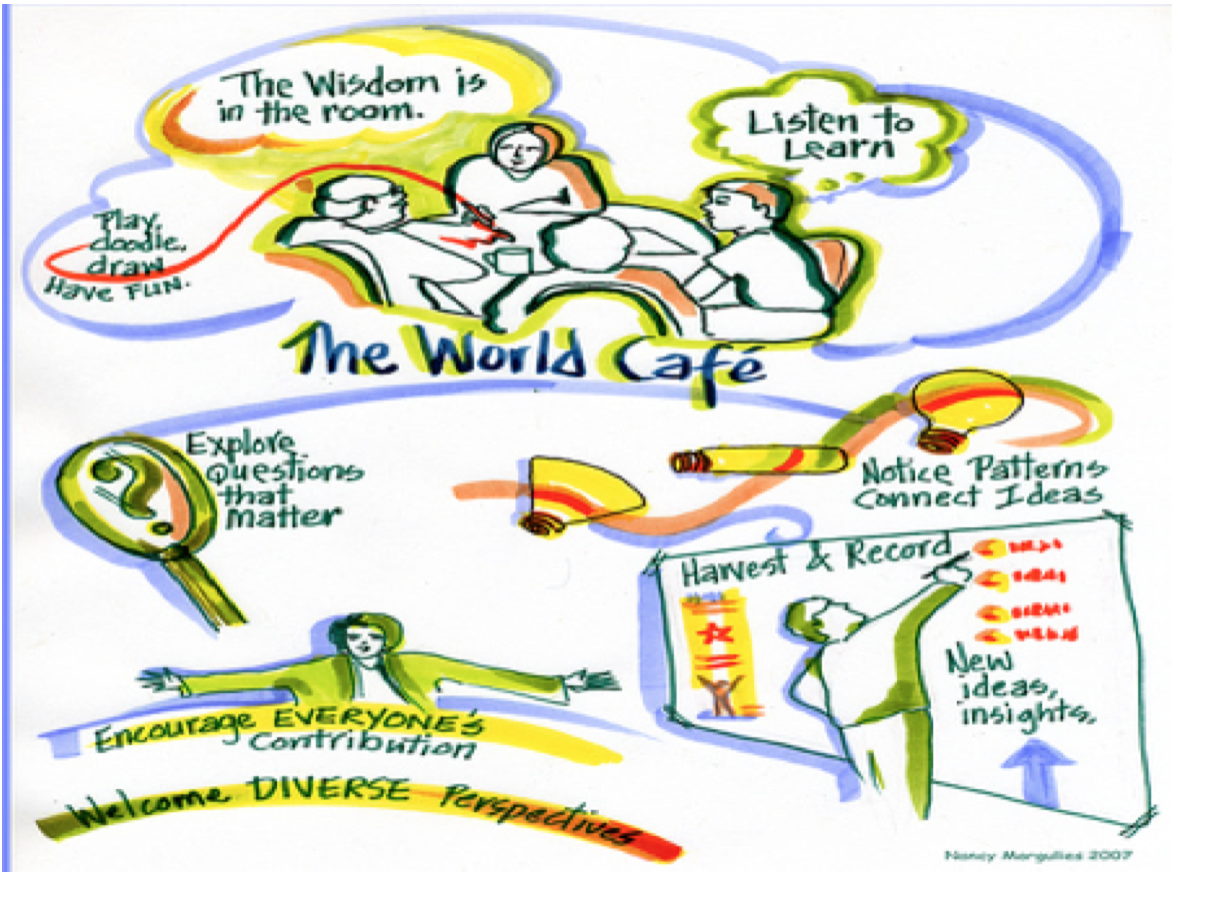
World Café principles
World Café group discussion about the results of the S4S-projects
Personal eye openers
Many challenge-based learning (CBL) formats have been developed in the S4S project. The personal eye openers are surprisingly similar. The following personal eye openers were discussed:
-
-
- VUCA / wicked problems. In many cases the challenges have a VUCA character; they represent aspects of volatility, uncertainty, complexity and ambiguity. Feeling comfortable with VUCA-character of challenges can be connected both to personality of participants. VUCA-aspects in S4S workshops complicate grading of students. VUCA is as part of life, and therefore important to highlight as a step towards accepting uncertainty.
- Creativity & innovation. Ideation methods and entrepreneurial thinking are important elements in the S4S modules and workshops. Students are creative in their ability to take an abstract defined challenge and break in down into operational units which they can tackle with their given resources. New tools such as Lego Serious Play and its positive effect on team building and the creative process.
- At student-business collaboration, developing technical and methodological knowledge are important aspects. However, most of all we train students’ skills. Skills development is an important aspect in addition to knowledge. Skills development requires attentions towards (1) self-reflection of participants; (3) teamwork and the different roles of individuals in a team; (3) effective facilitation. No longer only about the individual entrepreneur but rather about the entrepreneurial team and the different roles people can play in such a team.
- Organization & methodology. Challenge-based learning workshops should be integrated early in modules for self-awareness and development.
- Managing expectations. Sometimes, teachers, companies, and students have different expectations of the CBL-programs. Expectations should be properly managed at the start of the collaboration to have a fruitful process. Expectations of teachers, students and companies should be realistic, open minded, critical, and reflexive in their approach to student-business collaboration.
- Essential conditions. Qualifiers of CBL- programs are student engagement / commitment and the collaboration process between students and companies. Student enthusiasm can also motivate business partners. It is important to select students before or in the beginning of S4S-modules.
- Digitalization. Digitalization brings possibilities and challenges to student-business collaboration (e.g., more international teams, less impact from travelling but also different with creativity and team building). Online collaboration is possible but it cannot replace face-to-face meetings. Space and location are important. Digitization did work and allows for internationalization and upscaling.
-
Lessons learned (Do's & don'ts)
The S4S Final Conference presented the possibility for a meta-analysis to get an overview of the different activities during the project. The following aspects were highlighted:
-
-
- Transparency. Sometimes, business partners did not know what to expect from CBL-programs. Define clearly the benefit for students participating in the S4S formats. Do not promise too much in the project proposal or to business partners. More effective ways to share information and learnings from the activities is desirable and that this / these learnings are available more quickly to all partners/participants. It is important to communicate a transparent time management plan to students and business partners. Make expectations clear before activities/modules/collaborations. This goes for all (teachers, students and companies). Expectation management is key for the success of the collaboration.
- Innovation & creativity. Important with openness – all questions should be allowed!
- Organization. Direct feedback from business partners or co-creation between businesses and students are recommended. Module design is challenging when the module is a curricular module for some students and others take it as an extracurricular module. Structure important information to all partners in the CBL-program. Innovative ideas are easier to do in an extra-curriculum setting.
- Success factors. Commitment is central – from all parties! The engagement from the company is also key for the students to succeed. It is not enough to engage in such collaborations with just passion and motivation. Resources need to be allocated. As a business partner it is important to integrate the whole company in the collaboration. Both in terms of involving key personnel but also raise awareness in the whole company.
- Sustainability. There can be a better alignment with the activities and the SDG-goals – a better fit. Don’t underestimate sustainability – both in terms of its complexity as well as its possibilities.
- Skills. Challenge-based-learning is very important for skill development. Students are more attracted to real business challenge than to teacher-oriented challenges. Encourage experimentation. Students and companies should care about skills acquired not grades. Highlight/Enforce in communication with companies and students: “Outcomes are skills and experience rather than products and innovations.” There is a very low pick-up rate of ideas from the student business collaboration. This is not strange and applies even to ideas generated within companies. Educators also need to develop capabilities to work with challenge-based learning: entrepreneurial skills.
-
What missed? Improvements
-
-
- Learning goals. The learning goals could be better defined beforehand. Better visibility as to the longer-term goals and plans for what happens after the project funding ends, thus, how to transfer knowledge, both internationally and locally and thus more structural ways of doing this.
- Networking. Broaden the base for coloration to include public /private combinations, involving for example regional developments agencies engaged in sustainable projects and innovation development. Involvement of our official network partners. “Open-festival” with more network partners that are outside the S4S project. Collaborative platform incl. tools to use. Platform for exchange of knowledge between companies. A place to discuss challenges and to solutions applied for increased sustainability. Getting the opportunity to go out in industry and get some hands-on practice. Spreading the word about the S4S project even broader. More exchanges between project partners earlier in the project e.g., study visits.
- Skills. More work could be done to upscale entrepreneurial knowledge on sustainability, upscaling, and entrepreneurship amongst teachers at higher education institutes. In particular, the skills and capabilities required to interact with business and other external partners.
- Research. A more integrated research project approach will be appreciated e.g., the platform development could have been better connected to the other work packages. Measuring long-term outcomes and impacts of S4S formats for students and business partners. Evaluate the cooperation.
- Diversity. Diversity of business partners: e.g., more start-ups for a sustainability push and to encourage comparison and peer-to-peer learning.
- Policy & Strategy. Political agenda-setting, e.g., recommendations for policymaking to support challenge-based learning activities.
- Problem solving. Sometimes a “company-hands-on mentality” was missing in some S4S formats.
- Relation to existing curricula. Activities/modules often extracurricular => important to embed in study programs. Design activities in such a way so that ECTS can be given.
- Feedback and reporting. Improve feedback from company to students and vice versa. Was the results/process valuable. We need more KPIs for our final report
- Develop an app./tool for students’ self-assessment. This could be used throughout the module and support reflection and development.
-
Upscaling
Upscaling of student-business collaboration will influence the context in various ways: more international teams, more diversity in teams, more students, more teachers, more companies, more sustainable aspects. In order to increase the impact of S4S-activities and safeguard its results, the following suggestions were made:
-
-
- Expansion of activities, larger scope and timeframe. The following venues were discussed: funding for a longer time. International corporate training for students. Upscaling in terms of longer timeframe of activities or an increased number of students; the gains will vary (e.g. more in-depth results vs. more diverse activities). Involve more business partners from the value chain in the S4S projects. international expansion will incorporate more perspectives and more knowledge into S4S-formats. Increased collaboration between companies and universities. Learning from different personal networks. More incubation projects as a direct result of the S4S projects.
- Networking. Create long-lasting company-networks for exchange of knowledge and to be seen as a pool of resources to invite for collaboration. Exchange with young professionals in the S4S projects. Expand the S4S-project to a long-term collaboration, not only a project. Growing/strengthening ecosystems of entrepreneurs will accelerate sustainable change. Upscaling sustainability is not always about the size of a project/implementation but also about increasing its impact.
- Online activities can support upscaling. Scale up can also mean more resource efficient use of digital resources to reach a wider group of students and companies. Digital platform should also present the learnings from the S4S project.
- Promotion & PR. The benefits of the student-business collaboration should be clearly marketed to be able to “scale-up”.
-
Platform of challenges
Alexander Schabel of the Borderstep Institute presented the highlights and functionalities of the S4S-Platform: “Sustainable Venturing Challenges”. On businesses can present their challenges to be solved by (teams of) students. The platform contains a database of challenge platforms, testimonials, challenge examples, and specific resources. To further improve the platform, all consortium members gave their comments.


